
Juan Luis Guerra Seijas is a Dominican musician, singer, composer, and record producer. Throughout his career, he has won numerous awards including 28 Latin Grammy Awards, three Grammy Awards, and one Latin Billboard Music Award. He won 3 Latin Grammy Awards in 2010, including Album of the Year. In 2012, he won the Latin Grammy Award for Producer of the Year. He has sold 15 million records worldwide, making him one of the best-selling Latin music artists.

Para Ti is the ninth studio album by singer-songwriter Juan Luis Guerra and his band 4.40. It was released on August 31, 2004, by Vene Music and distributed by Universal Latin Music. It was his first studio album in six years since Ni es lo mismo ni es igual (1998) and is his first Christian-gospel inspired album. The lyrics are inspired by his conversion to Christianity and his experience of being a born again Christian. The album explores music genres from gospel and ballads to the salsa and merengue. The album was supported by the release of three official singles: "Para Ti", "Las Avispas" and "Dinteles".

Ni Es lo Mismo, Ni Es Igual is the eighth studio album recorded by Dominican singer-songwriter Juan Luis Guerra and his band 4.40. It was released by Karen Records on 15 December 1998 and distributed by PolyGram Latino. It was Guerra's comeback album after four years of silence, out of the public eye and since his conversion to Christianity. It was his first studio album since Fogarate (1994). The album production and songwriting were done by Guerra. The album was supported by the release of four official singles: "Mi PC", "Palomita Blanca", "El Niagara en Bicicleta" and "La Hormiguita". Two singles were released as promotional singles: "Vale La Pena" and "Quisiera".
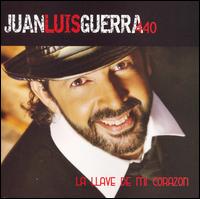
La Llave de Mi Corazón is the 10th studio album recorded by Dominican singer-songwriter Juan Luis Guerra, It was released by EMI Televisa Music on March 20, 2007. It was Guerra's first album to contain songs in English since his 1994 recording of Fogarate. The album contains fusions of mambo and tropical rhythms that Guerra himself defined as "Mambo merengue". Its production and musical structure of album is based on merengue, bachata and salsa and encompasses elements of Blues, Son, Jazz, Mambo and Bossa Nova. The album was written, arranged and produced by Juan Luis Guerra and according to the artist is his most romantic album. It is composed of four merengues, two bachatas, three romantic songs and two salsas.

Bachata Rosa is the fifth studio album by Dominican singer-songwriter Juan Luis Guerra and his group 4.40. It was released on 11 December 1990, by Karen Records. It brought bachata music into the mainstream in the Dominican Republic and gave the genre an international audience. A Portuguese version of the record was released in 1992 under the title Romance Rosa; it was certified gold in Brazil. The album received a Grammy Award for Best Tropical Latin Album and two Lo Nuestro Awards for Tropical Album of the Year and Tropical Group of the Year.

Ojalá Que Llueva Café is the fourth studio album by Dominican singer-songwriter Juan Luis Guerra released in 1989 by Karen Records. It is considered one of his most emblematic and important albums. The album set the musical path for his later albums, re-formulating Dominican merengue and bachata music through the contemporary elements of pop, rock, salsa, or jazz. Incorporating socially conscious lyrics with danceable merengues and romantic-poetic bachatas, the album is considered one of the most important albums of his discography.

Fogaraté! is the seventh album of the famous Dominican songwriter and musician Juan Luis Guerra. It was released on July 19, 1994. The album mixed a variety of music genres including rural and folkloric roots of merengue called "Perico Ripao" with elements of African soukus music and Tropical Music such as Reggae with the collaboration of African guitarist Diblo Dibala and Dominican accordionist Francisco Ulloa, along with Son, Bachata and Salsa. Also, the album features a particular, bachata-styled adaptation of the Lacrimosa movement from Mozart's Requiem Mass in D Minor and Guerra's first song fully in English "July 19". Exploring lyrics and themes about magical realism of Latin American literature and commenting on the politics of the Caribbean, for many fans and critics, Fogaraté! is one of his most musically complex album.
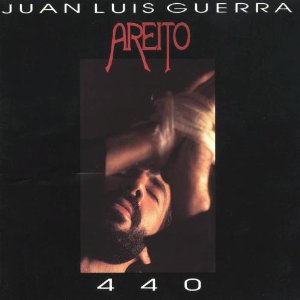
Areíto is the sixth album by Juan Luis Guerra with his band 440, released on 8 December 1992, by Karem Records. The album, meant to be a tribute to the indigenous tribes of the Dominican Republic, is named after a dance that the aboriginal inhabitants of the Greater Antilles (Taínos) accompanied with songs during their festivals and religious rites. The album contains twelve tracks including "Cuando te Beso", interpret by Santo Domingo Philharmonic Orchestra. Congolese musician Diblo Dibala played guitar on the song "El Costo de la Vida", which was a Spanish cover of his own soukous song "Kimia Eve", while the last track on the album, "Naboria daca, mayanimacaná", is sung in Arawak, the language of the Taíno people. Areíto was originally set to be released in early April 1992, but was first delayed to the end of October 1992 and was finally released on 8 December 1992.

A Son de Guerra, sometimes referred to as Asondeguerra, is the 11th studio album recorded by Dominican singer-songwriter Juan Luis Guerra, It was released by Capitol Latin on June 8, 2010. The album contains 11 tracks, and its musical structure and production are based on Merengue, Bachata, Son, Salsa, experimenting and incorporating elements of jazz, blues, funk, cumbia, rock, reggae, rap, and mambo. Lyrical themes on the album include protest against political corruption, immigration, love and romance. Featured appearances include Juanes and Chris Botti. For many fans and critics alike, it's his album with the most social content and strong social criticism since his 1992's Areito.

"Mi PC" is a song by Dominican Republic singer-songwriter Juan Luis Guerra and his band 4-40 from his eighth studio album, Ni Es lo Mismo Ni Es Igual (1998). The song was released as the lead single from the album in November 1998 by Karen Records. The song was written and produced by Guerra. It is a pop merengue track in which Guerra uses computer terminology to narrate a love story. "Mi PC" was met with positive reactions from music critics who found the lyrics to be clever and its music catchy.
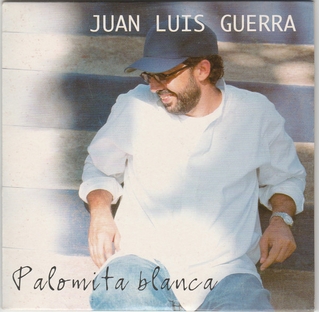
"Palomita Blanca" is a song by Dominican Republic singer-songwriter Juan Luis Guerra and his band 4-40 from his eighth studio album, Ni Es lo Mismo Ni Es Igual (1998). As with the rest of the album, the song was written and produced by Guerra. The song was released as the second single from the album in March 1999 by Karen Records. It is a bachata acoustic ballad about a man who is immensely in love with a woman and refuses to let her go.

"El Niágara en Bicicleta" is a song by Dominican Republic singer-songwriter Juan Luis Guerra and his band 4-40 from his eighth studio album, Ni Es lo Mismo Ni Es Igual (1998). The song was written and produced by Guerra. It was released as the third single from the album in 1999 by Karen Records. A merengue rap song, it sees the protagonist finding himself in a hospital that is in poor condition, based on Guerra's experience in one. The song received positive reactions from three music critics, who praised who praised its music and socially conscious lyrics.

Grandes Éxitos de Juan Luis Guerra y 440 or simply Grandes Éxitos is a compilation album of Dominican singer-songwriter Juan Luis Guerra, and his band 440 released in July 1995 by Karem Records. It contained Guerra's fifteen biggest hits from 1988 to 1994 on the original version and from the albums Mudanza y Acarreo(1985) to Fogarate! (1994) on the international versions. The compilation receive positive reviews by the critics.

Colección Romántica is a compilation album by Dominican songwriter and musician Juan Luis Guerra and 4.40. It was released in November 21, 2000 and February 6, 2001 in the United States by Karen Records. It is a dual album compilation including 20 of the group's classic songs remastered and re-recorded as ballads. The album also contained unaltered original versions of their softer songs, like acoustic ballads or bachatas. It would become Guerra's last album released under the Dominican independent music label Karen Records, as his later albums would be released under Vene Music and subsequently under EMI music and Capitol Latin.

Todo Tiene Su Hora is the 13th studio album by Dominican singer-songwriter Juan Luis Guerra and his band 4.40. It was released on November 11, 2014, by Capitol Latin and was produced by Juan Luis Guerra & Janina Rosado. Like his previous albums, the album is composed by variety of tropical music genres such as bachata, merengue, salsa and son but with different instrumentation normally used in classical music such as strings and violins. Guerra described the album as "innovative" and explored lyrics raging from love and romance to social conscience and protest against political corruption. The record encompassed elements of funk and jazz with merengue and classical music with bachata.
The Dominican singer, songwriter and producer Juan Luis Guerra has released 14 studio albums, two live albums and forty-eight singles. He is one of the best selling Latin artist of all time with more 30 millions of records worldwide. He made his debut with his first studio album Soplando, released in 1984. He later released his second studio album in 1985, Mundanza y Acarreo which was his first national success and marked his first entry at the US Billboard Charts at number seventeen on Billboard Tropical Charts. In 1987, his third studio album Mientras Más Lo Pienso...Tú become his first work to gain international attention in countries such as Venezuela and Puerto Rico. Between this last two albums, it sold over two million copies worldwide.
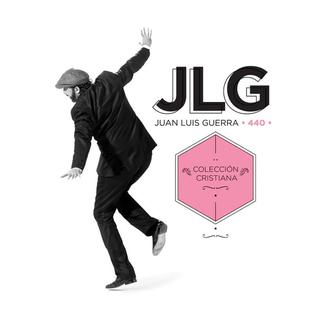
Colección Cristiana is the 12th album by Dominican songwriter and musician Juan Luis Guerra, released on February 28, 2012. It is also his first Christian album since 2004's Para Ti.
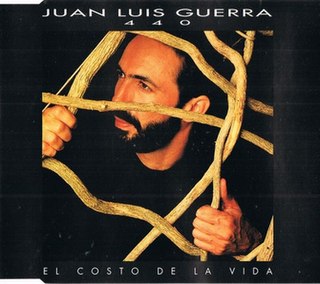
"El Costo de la Vida" is a song by Dominican Republic singer-songwriter Juan Luis Guerra from his sixth studio album, Areíto (1992). The song was released as the album's third single in 1992 by Karen Records. It is a Spanish-language adaptation of soukous song "Kimia Eve" composed by Diblo Dibala. The song features Dibala on the guitar and is performed by Guerra as a merengue number. The lyrics to the song provides a social commentary to the rising cost of living, while Guerra denounces the dislevel of socioeconomics as well as political corruptions in Latin America. Guerra also references the racial identities of Latin America.

Entre Mar y Palmeras is the second live album of the Dominican artist Juan Luis Guerra and 4.40. It was released on June 18, 2022 along with special concert, an open-air and audience-free concert, broadcast by HBO special, premiere on June 3, 2021, performing the songs and was recorded at the Esmeralda Beach, Miches in the Dominican Republic. It contains 16 live versions of hits and was directed by Guerra's oldest son, Jean Guerra. The album won Best Long Form Music Video at the 22nd Annual Latin Grammy Awards and Best Merengue/Bachata Album at the 23rd Annual Latin Grammy Awards. Also, it was nominated for Album of the year at the 2022 Lo Nuestro Awards.
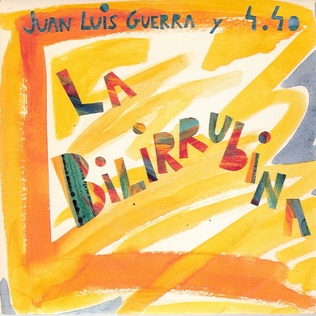
"La Bilirrubina" is a song by Dominican singer-songwriter Juan Luis Guerra. It was written by Guerra and released by Karem Records on 1990 and 1991 in Europe as the second single from his fifth studio album, Bachata Rosa. It was nominated for Record of the Year at 1991 Lo Nuestro Awards. The merengue track is considered one of Guerra's signature songs and most popular. It receive positive reviews and was listed one of the best tracks of the album.















